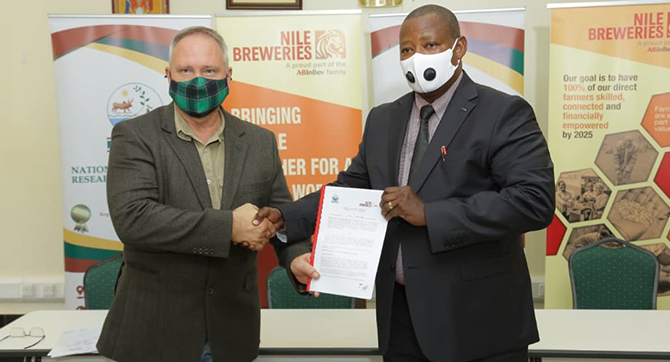
Nile Breweries Ltd has entered a partnership with the National Agricultural Research Organisation (NARO) to boost commercial cassava production. The two bodies signed a memorandum of understanding earlier this week on Tuesday at NARO offices in Namulonge. “Nile Breweries will support transfer and dissemination of agricultural research and development technologies from NARO to the farming communities and value chains,” said Theunis Coetzee, Agric Services Manager, NBL. “We are considering production from cassava as it has numerous health advantages compared to other raw materials. Cassava contains much energy, natural sugars which can be used instead of adding sugar in the beer,” he added.
According to NARO Director General, Dr. Ambrose Agona, the agricultural agency will extend agricultural research technology to local farmers supplying raw materials used in beer production. “The benefit of the partnership is that we can test the new varieties that will possibly be commercialized before they are available on the market. This will address the need to improve the quality and quantity of raw materials (cassava), whose demand is expected to increase as Nile Breweries focuses on turning it into one of their major raw materials,” said Dr Agona. The NARO team, led by Dr Agona, handed four cassava varieties to NBL for testing in the field.
In the past years, cassava has been produced in Uganda specifically for food as well as distillation of ethanol. The 5 year partnership is expected to boost cassava production from 6 metric tonnes per hectare to 50 or 25 metric tonnes per hectare. “Production of beer using local materials will lead to the creation of employment, low cost of production as well as increased production whereby in case we produce excess beers, we shall export the rest to our neighbouring countries,” added Dr Agona.
The partnership with Naro is a continuation of NBL’s commitment to local sourcing and improving livelihoods of Ugandan Farmers. It uses materials cassava, barley and sorghum. With the current local sourcing at 98%, annually, NBL purchases around US$23M worth of produce from local farmers. It plans to spend atleast US$11K annually to research on more productive cassava varieties. NBL currently invests up to UGX795M annually to upskill, connect and financially empower our farmers. “We have deployed crop protection pilots to reduce farmer risk, we expect to have 6,500 farmers skilled in crop management protocols, and we have close to 3,000 farmers empowered with mobile phones and 4,400 financially empowered through input loans and crop insurance in collaboration with Stanbic,” NBL MD David Valencia recently revealed during NBL’s Economic Forum held in Kampala last month.
NBL spends atleast Ush 52bn on Ugandan farmers (NKC African Economics report 2020). According to the report, 89% of NBL-supplying farmers reported that their quality of life had improved and indeed Sorghum farming households supplying NBL reported to have doubled their income. NBL agriculture sustainability goal is to have 100% of its direct farmers skilled, connected and financially empowered by 2025 though all engagements with farmers are geared towards those 3 aspects.